考研英语牛人分享:三遍搞定大纲词汇
考研英语词汇高效记忆法(绝对有效)

考研英语词汇高效记忆法(绝对有效)考研英语词汇高效记忆法(绝对有效)本人的学习方法,是在看考研图书《考研英语词汇分级速成手册》的时候制定出来的,所以建议大家可以买一本此书,先试用一下我的方法,然后可以将此方法推广试用到其他图书。
使用此方法,本人花了30天的时间,每天6小时,将这本书的单词记忆达到95%以上,希望此方法能供大家参考借鉴。
要讲到我的方法,就不得不先提到这本书的内容结构,此书把考研大纲5500个词汇以及300多个超纲词汇按难易程度分为5级。
一级是最容易的常用高频词(是比较简单的,大部分同学只要扫一到两遍即可搞定),二级是基础词汇(可能需要五到七遍),三级是次级难度词汇,四级为考研英语纲内难词,第五级为超纲词汇,还有第六部分是考研常出词组。
本人将此记忆方法进行总结,提供给考研的同仁,希望大家能从中获得一些学习方法方面的灵感,更希望,大家有好的学习方法也能共享出来,我们大家互相学习,共同进步。
每天上午2小时,下午2小时,晚上2小时(当然,前提是本人辞职考研,有充足的时间),每天共6个小时,将考研图书《考研英语词汇分级速成手册》五级词汇与词组共同分为六个部分,将此六个部分三个三个按121的记忆方式进行循环记忆,即第一天的上午2小时,要将第一部分记2遍,第二部分记三遍,第六部分记一遍,下午和晚上重复;第二天上午,将第一部分记一遍,第二部分记2遍,第三部分记3遍,下午和晚上重复;以此类推,进行循环记忆.方法效率提示:1、要重点要注意,碰到比较陌生的单词不可恋战,这种记忆方法的重点就是要以速度取胜。
2、在以速度为主的前提下,陌生的单词可先重点记忆单词和主要重点的中文意思,等这两点相对得比较牢固时,再将注意力转向其他延伸的意义、例句、同义词、反义词等,循序渐进,逐渐扩大延展记忆的广度和深度。
等看到考研图书《考研英语词汇分级速成手册》时,你就会明白这么说的用意。
如果有疑问的,可以交流谈讨。
如果有更好学习方法的,欢迎共享。
新东方考研词汇(乱序)使用三“步”曲

新东方词汇乱序使用三“步”曲
(作者:鲁夫莎)
第一步:初记25天(2 list/day)
1.先听一遍MP3,边听边用荧光笔标记下自己不熟悉(黄色)和不认识(橘黄色)的词汇。
2.学习内容:①词义,包括构词法;②例句,包括例句中的陌生和重要词汇,做标记和注释;③例句的翻译;④标记有“考点”的内容;
3.每页学习完毕的时候把在每页的最下方做标记(把以前已经掌握的词汇打勾)。
4.每个LIST完毕,再次听一下MP3.
第二步:记忆17天(3 list/day)
1.听一遍MP3(全部).
2.记忆带有颜色的单词。
3.识记“考点”和“长难句”。
4.着重记忆那些标注书中频率条较长的词汇(结合已注的颜色圈句号、打勾和画三角符号)。
5.完成以上内容后,听MP3熟悉“超纲词汇”。
第三步:重复记忆(时间不限和循环:5 list/day)。
1.记忆“圈句号、打勾和画三角符号”的词汇。
2.熟悉“考点”和“长难句”以及书后面的词组和其它。
3.听MP3.
-------
要造就一大批人,这些人是革命的先锋队。
这些人具有政治远见。
这些人充满着斗争精神和牺牲精神。
这些人是胸怀坦白的,忠诚的,积极的,与正直的。
这些人不谋私利,惟一的为着民族与社会的解放。
这些人不怕困难,在困难面前总是坚定的,勇敢向前的。
这些人不是狂妄分子,也不是风头主义者,而是脚踏实地富于实际精神的人们。
中国要有一大群这样的先锋分子,中国革命的任务就能够顺利的解决。
考研英语真题的正确用法:三遍精读

考研英语真题的正确用法:三遍精读摘要:要说考研英语真题的重要性,大家可能都会说,多刷几遍就好了,可是老师要告诉你,并不是那么回事。
快随老师一起来解锁英语真题的正确使用姿势三遍精读法。
真题是模拟题无法相比的,精读研究真题非常重要,对近10年的真题一定要至少研究3遍(注意是研究,不是简单刷几遍)。
►第一遍:(恶补基础)①严格按照考试时间和要求,创造最贴近考试的环境来完成真题。
第一次使用真题时同学们大多数都是单词还没背完,所以不必在意测试出来的成绩和正确率,你可以按照考试时间来做,当然这个时候作文可以不写,但是其他部分你一定要认真的完成。
这次做真题的目的主要是让你了解考研英语真题的难度和自己的基础情况,虐一虐更有助于成长。
接下来要做的是对照答案和解析,详细看一遍自己错误的地方,看看自己是马虎失分,还是知识点没有掌握好失的分。
这是个重要的环节,你花半天时间或者一个晚上看解析都不为过哦。
②摘抄难点、易错点,补充基础。
用《考研真相》时,一定要仔细的去研读解析词汇和语法的部分。
将自己做题过程中遇到的生词、陌生词组对照【词汇注释】仔细的看一下,这部分不仅给出了该词的不同词性以及近义词等,还给出了一个新的例句帮你理解单词,若在这个基础上你还是记不住这个单词,则一定要整理到笔记本上,这个词汇本是后期要反复看的,目的是维持并增加词汇量。
再者,真题中有大量的固定搭配,这些也是需要你记忆的,用《考研真相》不用查字典就能帮你积累很多的单词。
《考研真相》逐句解析真题。
对于自己暂时记不住或者不能理解的句子,则应该及时摘抄出来,并且配合【句子讲解】和【句子图解】的部分分析句子结构,理清句子脉络,在后期复习的时候也要重复记忆。
如果这个句子是长难句,你更需要花费大量的时间来理解,而且这些句子你也可以记下来,作为写作的素材。
这是很关键的一步,也是补充基础必须要做的一步。
►第二遍:搞清做题的思路(重要)不管题目你是做对了,还是做错了,都要在真题的原文里面找到它的出处,搞清楚出题人在这里想要考察什么,你为什么做错了,是因为哪里遗忘了?还是哪里没有复习到位?这一步真的非常的关键,可以真正帮你扫清你的知识盲点。
考研英语如何搞定大纲的阅读理解
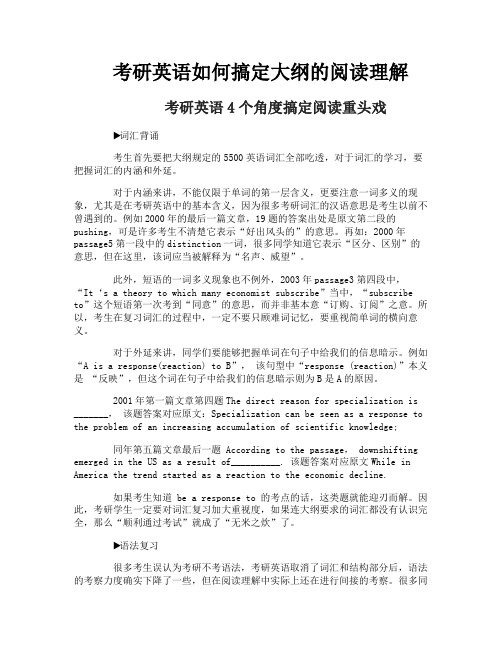
考研英语如何搞定大纲的阅读理解考研英语4个角度搞定阅读重头戏▶词汇背诵考生首先要把大纲规定的5500英语词汇全部吃透,对于词汇的学习,要把握词汇的内涵和外延。
对于内涵来讲,不能仅限于单词的第一层含义,更要注意一词多义的现象,尤其是在考研英语中的基本含义,因为很多考研词汇的汉语意思是考生以前不曾遇到的。
例如2000年的最后一篇文章,19题的答案出处是原文第二段的pushing,可是许多考生不清楚它表示“好出风头的”的意思。
再如:2000年passage5第一段中的distinction一词,很多同学知道它表示“区分、区别”的意思,但在这里,该词应当被解释为“名声、威望”。
此外,短语的一词多义现象也不例外,2003年passage3第四段中,“It‘s a theory to which many economist subscribe”当中,“subscribe to”这个短语第一次考到“同意”的意思,而并非基本意“订购、订阅”之意。
所以,考生在复习词汇的过程中,一定不要只顾难词记忆,要重视简单词的横向意义。
对于外延来讲,同学们要能够把握单词在句子中给我们的信息暗示。
例如“A is a response(reaction) to B”,该句型中“response (reaction)”本义是“反映”,但这个词在句子中给我们的信息暗示则为B是A的原因。
2001年第一篇文章第四题The direct reason for specialization is _______,该题答案对应原文:Specialization can be seen as a response to the problem of an increasing accumulation of scientific knowledge;同年第五篇文章最后一题 According to the passage, downshifting emerged in the US as a result of__________. 该题答案对应原文While in America the trend started as a reaction to the economic decline.如果考生知道 be a response to 的考点的话,这类题就能迎刃而解。
三三速记考研英语词汇

三三速记考研英语词汇
三三速记考研英语词汇是一种辅助记忆考研英语词汇的方法,具体步骤如下:
1. 准备:
- 找一本空白的笔记本,将每页分成三列,每列都留下足够的空间。
- 根据自己的需求和复习进度,确定每天需要记忆的单词数量。
2. 记忆:
- 在每个记忆单词的右上角标上序号,方便复习。
- 从左到右,按每列填写单词及其释义。
- 将每个单词的词形、词义、例句等重要信息写在单词右边的栏位中。
- 尽量使用简洁的词语和简单的例句,方便记忆。
3. 复习:
- 用目测或计时器的方式,快速复习每个词汇的词义。
- 逐列地复习,先记忆其中一列的词义,然后再看词意列对照。
- 根据记忆的效果,打勾或打圈确认自己对每个单词的记忆程度。
- 重点复习自己记忆不熟悉的单词,并用不同的例句或词形来加深记忆。
此方法的优点是简单易行,可以有效提高词汇记忆效果,缺点
是较为单一,不适合所有人。
需要根据个人情况来调整记忆的速度和方式,以达到更好的效果。
考研英语阅读3刷怎么刷
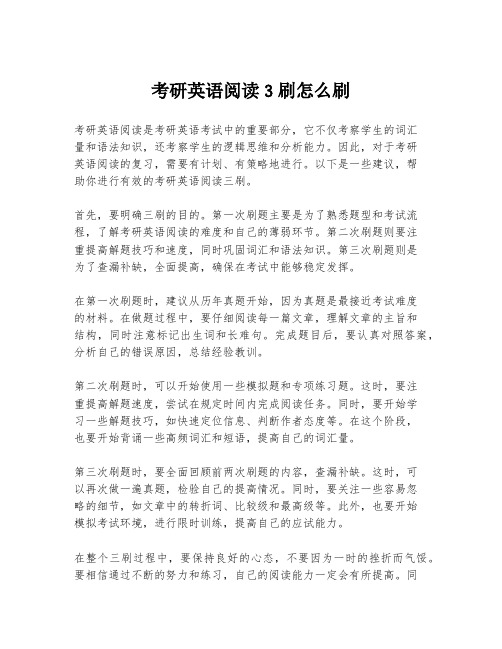
考研英语阅读3刷怎么刷考研英语阅读是考研英语考试中的重要部分,它不仅考察学生的词汇量和语法知识,还考察学生的逻辑思维和分析能力。
因此,对于考研英语阅读的复习,需要有计划、有策略地进行。
以下是一些建议,帮助你进行有效的考研英语阅读三刷。
首先,要明确三刷的目的。
第一次刷题主要是为了熟悉题型和考试流程,了解考研英语阅读的难度和自己的薄弱环节。
第二次刷题则要注重提高解题技巧和速度,同时巩固词汇和语法知识。
第三次刷题则是为了查漏补缺,全面提高,确保在考试中能够稳定发挥。
在第一次刷题时,建议从历年真题开始,因为真题是最接近考试难度的材料。
在做题过程中,要仔细阅读每一篇文章,理解文章的主旨和结构,同时注意标记出生词和长难句。
完成题目后,要认真对照答案,分析自己的错误原因,总结经验教训。
第二次刷题时,可以开始使用一些模拟题和专项练习题。
这时,要注重提高解题速度,尝试在规定时间内完成阅读任务。
同时,要开始学习一些解题技巧,如快速定位信息、判断作者态度等。
在这个阶段,也要开始背诵一些高频词汇和短语,提高自己的词汇量。
第三次刷题时,要全面回顾前两次刷题的内容,查漏补缺。
这时,可以再次做一遍真题,检验自己的提高情况。
同时,要关注一些容易忽略的细节,如文章中的转折词、比较级和最高级等。
此外,也要开始模拟考试环境,进行限时训练,提高自己的应试能力。
在整个三刷过程中,要保持良好的心态,不要因为一时的挫折而气馁。
要相信通过不断的努力和练习,自己的阅读能力一定会有所提高。
同时,也要注意休息和调整,避免过度疲劳。
最后,考研英语阅读的复习是一个长期的过程,需要持之以恒的努力。
通过有效的三刷策略,相信你一定能够在考试中取得理想的成绩。
考研英语大纲记住词汇的方法
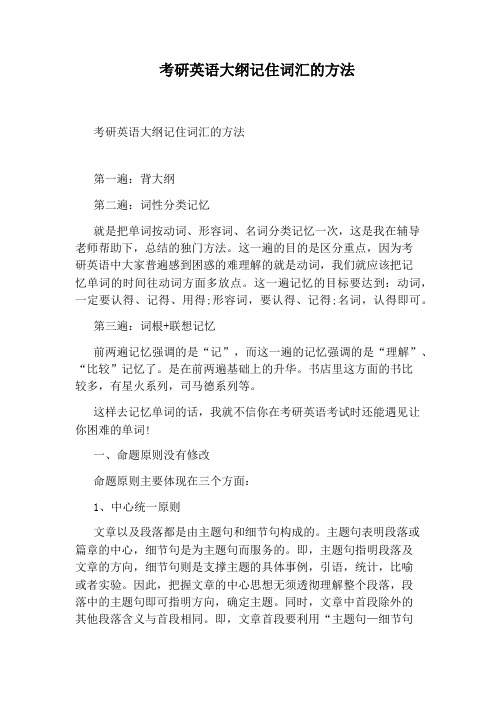
考研英语大纲记住词汇的方法考研英语大纲记住词汇的方法第一遍:背大纲第二遍:词性分类记忆就是把单词按动词、形容词、名词分类记忆一次,这是我在辅导老师帮助下,总结的独门方法。
这一遍的目的是区分重点,因为考研英语中大家普遍感到困惑的难理解的就是动词,我们就应该把记忆单词的时间往动词方面多放点。
这一遍记忆的目标要达到:动词,一定要认得、记得、用得;形容词,要认得、记得;名词,认得即可。
第三遍:词根+联想记忆前两遍记忆强调的是“记”,而这一遍的记忆强调的是“理解”、“比较”记忆了。
是在前两遍基础上的升华。
书店里这方面的书比较多,有星火系列,司马德系列等。
这样去记忆单词的话,我就不信你在考研英语考试时还能遇见让你困难的单词!一、命题原则没有修改命题原则主要体现在三个方面:1、中心统一原则文章以及段落都是由主题句和细节句构成的。
主题句表明段落或篇章的中心,细节句是为主题句而服务的。
即,主题句指明段落及文章的方向,细节句则是支撑主题的具体事例,引语,统计,比喻或者实验。
因此,把握文章的中心思想无须透彻理解整个段落,段落中的主题句即可指明方向,确定主题。
同时,文章中首段除外的其他段落含义与首段相同。
即,文章首段要利用“主题句—细节句原则”准确确定主题句;其他段落,段落中间句前有转折词看转折词所在句,无转折词直接看段首句。
同时,其他段落确定段落内容的语句中的词汇都与首段主题词有关。
2、主题句,细节句原则阅读理解文章以及文章中的每一个段落都是由不同的功能句组成的。
根据功能句的特点和作用,可以将句子分成两类:主题句和细节句。
段落的主题句可以出现在段首,也可以出现在段尾,有时也出现在段落中间。
如果出现在段落中间,必须在转折意义的but,however,surprisingly,virtually,indeed,infact,yet或now的后面,否则段首或段尾的语言完整,形式简洁,观点明确的句子即为主题句。
即,段落摆在面前,首先跳读段落中间句:如果中间句前有转折词,那么转折词所在句一般是主题句;如果中间句前没有转折词,那么段落首句后者尾句语言完整,形式简洁,观点明确的句子即为主题句。
考研英语词汇积累三大招
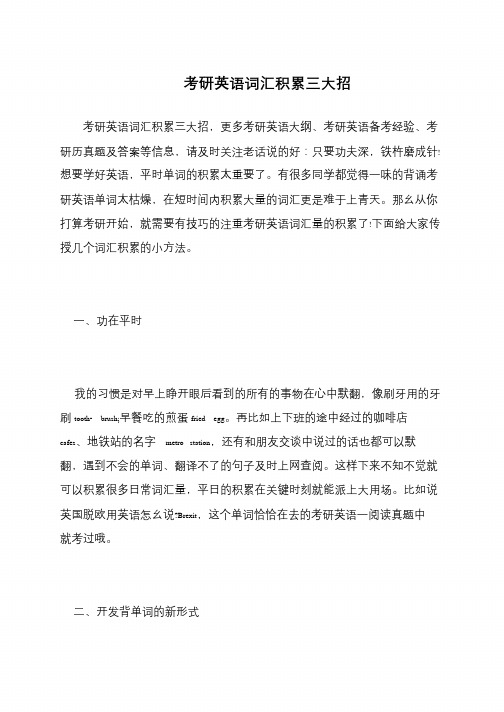
考研英语词汇积累三大招
考研英语词汇积累三大招,更多考研英语大纲、考研英语备考经验、考
研历真题及答案等信息,请及时关注老话说的好:只要功夫深,铁杵磨成针! 想要学好英语,平时单词的积累太重要了。
有很多同学都觉得一味的背诵考
研英语单词太枯燥,在短时间内积累大量的词汇更是难于上青天。
那幺从你
打算考研开始,就需要有技巧的注重考研英语词汇量的积累了!下面给大家传
授几个词汇积累的小方法。
一、功在平时
我的习惯是对早上睁开眼后看到的所有的事物在心中默翻,像刷牙用的牙刷tooth- brush;早餐吃的煎蛋fried egg。
再比如上下班的途中经过的咖啡店cafes、地铁站的名字metro station,还有和朋友交谈中说过的话也都可以默翻,遇到不会的单词、翻译不了的句子及时上网查阅。
这样下来不知不觉就
可以积累很多日常词汇量,平日的积累在关键时刻就能派上大用场。
比如说
英国脱欧用英语怎幺说?Brexit,这个单词恰恰在去的考研英语一阅读真题中
就考过哦。
二、开发背单词的新形式。
拿捏阅读!3天搞定350词

拿捏阅读!3天搞定350词英文版Reading is an essential skill that everyone should develop. It not only helps us gain knowledge and information but also improves our language skills. However, many people struggle with reading, either due to lack of interest or difficulty in comprehension. If you are one of those people, fear not! With the right approach and dedication, you can improve your reading skills in just 3 days.Day 1: Set a GoalThe first step to improving your reading skills is to set a goal. Determine how many words you want to read in a day and stick to it. Start with a manageable number, such as 100 words, and gradually increase it as you become more comfortable. This will help you stay focused and motivated throughout the process.Day 2: Practice, Practice, PracticeThe key to becoming a better reader is practice. Spend at least an hour each day reading different types of materials, such as books, articles, and newspapers. Pay attention to your reading speed and comprehension level. If you find yourself struggling with certain words or passages, take the time to look them up and understand their meanings.Day 3: Test YourselfOn the final day, test your reading skills by taking a comprehension test. Choose a passage from a book or article and read it carefully. Then, answer a set of questions based on the passage. This will help you gauge your progress and identify areas where you need improvement.By following these simple steps, you can improve your reading skills in just 3 days. Remember, practice makes perfect, so keep reading and challenging yourself to become a better reader.拿捏阅读!3天搞定350词阅读是每个人都应该培养的重要技能。
考研英语必备词汇
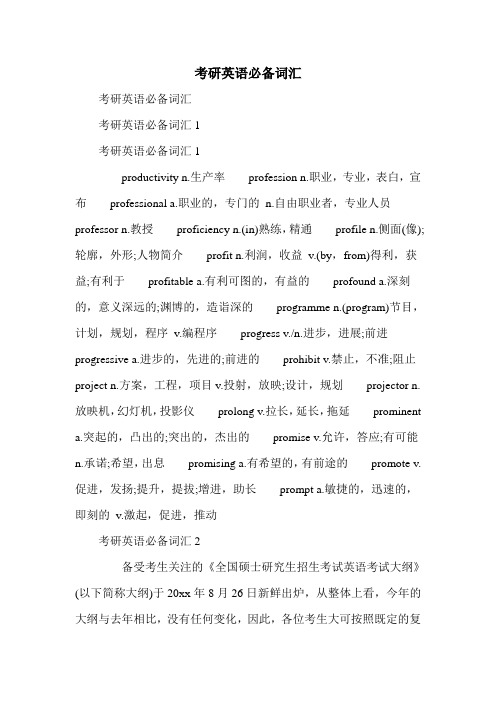
考研英语必备词汇考研英语必备词汇考研英语必备词汇1考研英语必备词汇1productivity n.生产率profession n.职业,专业,表白,宣布professional a.职业的,专门的n.自由职业者,专业人员professor n.教授proficiency n.(in)熟练,精通profile n.侧面(像);轮廓,外形;人物简介profit n.利润,收益v.(by,from)得利,获益;有利于profitable a.有利可图的,有益的profound a.深刻的,意义深远的;渊博的,造诣深的programme n.(program)节目,计划,规划,程序v.编程序progress v./n.进步,进展;前进progressive a.进步的,先进的;前进的prohibit v.禁止,不准;阻止project n.方案,工程,项目v.投射,放映;设计,规划projector n.放映机,幻灯机,投影仪prolong v.拉长,延长,拖延prominent a.突起的,凸出的;突出的,杰出的promise v.允许,答应;有可能n.承诺;希望,出息promising a.有希望的,有前途的promote v.促进,发扬;提升,提拔;增进,助长prompt a.敏捷的,迅速的,即刻的v.激起,促进,推动考研英语必备词汇2备受考生关注的《全国硕士研究生招生考试英语考试大纲》(以下简称大纲)于20xx年8月26日新鲜出炉,从整体上看,今年的大纲与去年相比,没有任何变化,因此,各位考生大可按照既定的复习思路继续备考。
那么相对于试卷上客观存在的5类题型,很多考生在备考过程中容易忽略掉一个最最基础的内容词汇。
本文将结合最新的考纲及真题,为各位考生总结归纳9月份以后词汇备考策略。
到了9月份以后,考生们开始专注于各个题型的解题技巧的学习或真题的演练。
而做过真题的同学必然会发现,通过解题技巧定位出题目答案所在的范围后,面临的最大的问题就是锁定的那句话读不明白,原因很简单:单词不认识。
英语三遍做题法
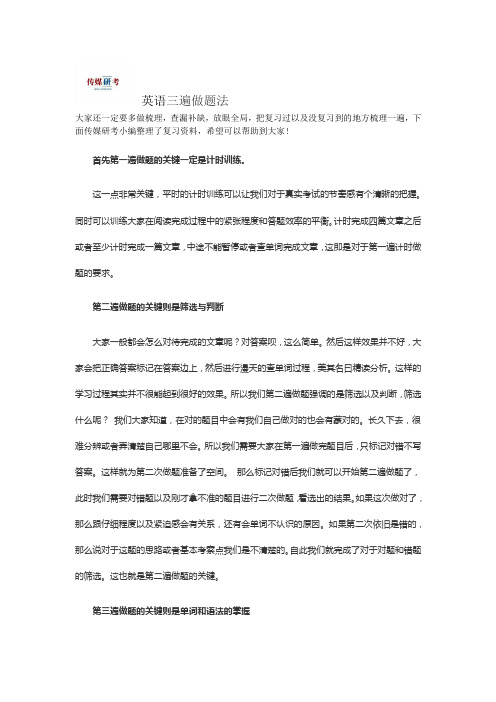
英语三遍做题法大家还一定要多做梳理,查漏补缺,放眼全局,把复习过以及没复习到的地方梳理一遍,下面传媒研考小编整理了复习资料,希望可以帮助到大家!首先第一遍做题的关键一定是计时训练。
这一点非常关键,平时的计时训练可以让我们对于真实考试的节奏感有个清晰的把握。
同时可以训练大家在阅读完成过程中的紧张程度和答题效率的平衡。
计时完成四篇文章之后或者至少计时完成一篇文章,中途不能暂停或者查单词完成文章,这即是对于第一遍计时做题的要求。
第二遍做题的关键则是筛选与判断大家一般都会怎么对待完成的文章呢?对答案呗,这么简单。
然后这样效果并不好,大家会把正确答案标记在答案边上,然后进行漫天的查单词过程,美其名曰精读分析。
这样的学习过程其实并不很能起到很好的效果。
所以我们第二遍做题强调的是筛选以及判断,筛选什么呢?我们大家知道,在对的题目中会有我们自己做对的也会有蒙对的。
长久下去,很难分辨或者弄清楚自己哪里不会。
所以我们需要大家在第一遍做完题目后,只标记对错不写答案。
这样就为第二次做题准备了空间。
那么标记对错后我们就可以开始第二遍做题了,此时我们需要对错题以及刚才拿不准的题目进行二次做题,看选出的结果。
如果这次做对了,那么跟仔细程度以及紧迫感会有关系,还有会单词不认识的原因。
如果第二次依旧是错的,那么说对于这题的思路或者基本考察点我们是不清楚的。
自此我们就完成了对于对题和错题的筛选。
这也就是第二遍做题的关键。
第三遍做题的关键则是单词和语法的掌握经过两边做题,题目的基本意思和考察点我们都弄明白了。
接下来就是去积累文章中的词汇和相应的语法点了。
此时我们再一点一点分析文章,但是仍然建议以文章提问的段落为主,不要满篇乱跑,精力相对较为分散。
经过上面三次做题,我们对于文章的思路,考题,基础知识都有了多方面的掌握和认识,同时每完成一篇文章我们就积累了许多生词和难句,也很好的利用了有限的考题和资源。
以上是传媒研考为考生整理的考研的相关内容,希望对大家有帮助,传媒研考小编预祝大家都能取得好成绩!。
40篇短文搞定英语考研核心词汇
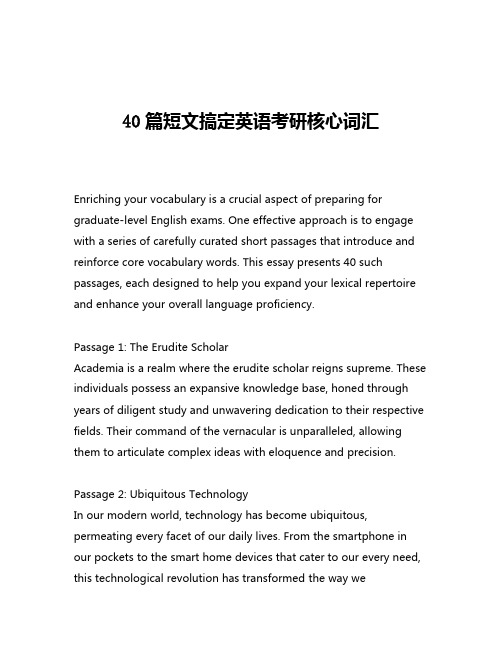
40篇短文搞定英语考研核心词汇Enriching your vocabulary is a crucial aspect of preparing for graduate-level English exams. One effective approach is to engage with a series of carefully curated short passages that introduce and reinforce core vocabulary words. This essay presents 40 such passages, each designed to help you expand your lexical repertoire and enhance your overall language proficiency.Passage 1: The Erudite ScholarAcademia is a realm where the erudite scholar reigns supreme. These individuals possess an expansive knowledge base, honed through years of diligent study and unwavering dedication to their respective fields. Their command of the vernacular is unparalleled, allowing them to articulate complex ideas with eloquence and precision.Passage 2: Ubiquitous TechnologyIn our modern world, technology has become ubiquitous, permeating every facet of our daily lives. From the smartphone in our pockets to the smart home devices that cater to our every need, this technological revolution has transformed the way wecommunicate, work, and entertain ourselves.Passage 3: Altruistic EndeavorsAmidst the hustle and bustle of our increasingly complex society, there are those who choose to devote their time and energy to altruistic endeavors. These individuals, driven by a deep sense of compassion and a desire to make a positive impact, selflessly contribute to the betterment of their communities and the world at large.Passage 4: Meticulous Attention to DetailIn certain professions, a meticulous attention to detail is of paramount importance. Whether it's the surgeon carefully navigating a delicate procedure or the architect meticulously designing a structurally sound building, this unwavering focus on precision and accuracy is the hallmark of true excellence.Passage 5: Panacea for Social IllsThroughout history, visionaries have sought to find a panacea – a universal remedy – for the ever-evolving social ills that plague humanity. From poverty and inequality to climate change and global conflict, the search for comprehensive solutions to these complex challenges remains a constant pursuit for those who aspire to create a better world.Passage 6: Ubiquitous ConnectivityThe advent of the digital age has ushered in an era of ubiquitous connectivity, where the world has become a global village. With the click of a button, we can communicate with loved ones across continents, access a wealth of information, and collaborate on projects with colleagues from diverse backgrounds.Passage 7: Pernicious ConsequencesWhile progress can be a boon, it often comes with pernicious consequences that must be addressed. The rapid industrialization and urbanization of our societies, for instance, have led to environmental degradation, the depletion of natural resources, and the widening of socioeconomic disparities, all of which pose grave threats to our collective wellbeing.Passage 8: Reconciling Divergent PerspectivesIn an increasingly pluralistic world, the ability to reconcile divergent perspectives is a valuable skill. Whether it's navigating complex political negotiations or fostering understanding between individuals with vastly different cultural backgrounds, the capacity to find common ground and bridge divides is essential for fostering harmony and progress.Passage 9: Ubiquitous SurveillanceThe proliferation of surveillance technologies has led to an era ofubiquitous surveillance, where our every move and interaction can be monitored and recorded. While these systems may promise enhanced security and convenience, they also raise profound questions about privacy, civil liberties, and the delicate balance between individual freedoms and societal needs.Passage 10: Panacea for Technological WoesAs our reliance on technology continues to grow, the search for a panacea – a universal solution – to address the myriad of technological challenges we face becomes increasingly urgent. From cybersecurity threats to the ethical dilemmas posed by artificial intelligence, the need for comprehensive and innovative approaches to these issues is paramount.Passage 11: Erudite InsightsThe erudite insights of leading experts and scholars can be invaluable in helping us navigate the complexities of the modern world. Whether it's a groundbreaking scientific discovery or a thought-provoking analysis of sociopolitical trends, these individuals possess the depth of knowledge and intellectual prowess to shed light on the most pressing issues of our time.Passage 12: Ubiquitous DisinformationIn the digital age, the proliferation of ubiquitous disinformation poses a significant challenge to our collective understanding ofreality. The ease with which false narratives and misleading information can spread online has undermined the credibility of traditional sources of information and eroded public trust in institutions and authority figures.Passage 13: Altruistic InterventionsIn the face of global crises and humanitarian emergencies, the global community often relies on altruistic interventions to provide aid and support to those in need. From disaster relief efforts to long-term development projects, these initiatives are driven by a deep-rooted sense of compassion and a commitment to improving the lives of the most vulnerable populations.Passage 14: Meticulous Data AnalysisIn the age of big data, meticulous data analysis has become a critical skill for professionals across a wide range of industries. From finance to healthcare, the ability to meticulously gather, process, and interpret vast amounts of information is essential for informed decision-making and the development of innovative solutions to complex problems.Passage 15: Pernicious BiasesDespite our best intentions, we all possess pernicious biases that can unconsciously shape our perceptions, judgments, and behaviors. These deep-seated prejudices, often rooted in socioculturalconditioning, can have far-reaching consequences, perpetuating inequality, discrimination, and the marginalization of vulnerable communities.Passage 16: Ubiquitous AutomationThe rise of ubiquitous automation, driven by advancements in artificial intelligence and robotics, has had a profound impact on the way we live and work. While these technological innovations have the potential to increase efficiency and productivity, they also raise concerns about job displacement, the disruption of traditional industries, and the ethical implications of machines taking on increasingly autonomous roles.Passage 17: Altruistic PhilanthropyIn an era marked by growing wealth disparities, altruistic philanthropy has emerged as a powerful force for social change. Wealthy individuals and organizations who choose to direct their resources towards charitable causes and the betterment of society demonstrate a deep commitment to addressing pressing issues and creating a more equitable world.Passage 18: Meticulous Legal DraftingThe field of law requires a meticulous attention to detail, particularly in the realm of legal drafting. Crafting airtight contracts, meticulously crafted legislation, and precise legal arguments demands a keen eyefor nuance and an unwavering commitment to linguistic precision, ensuring that legal documents withstand scrutiny and effectively serve their intended purpose.Passage 19: Pernicious Power DynamicsEmbedded within the fabric of our social, political, and economic systems are pernicious power dynamics that perpetuate inequality, marginalization, and the concentration of wealth and influence in the hands of a privileged few. Recognizing and addressing these deeply entrenched hierarchies is a critical step towards creating a more just and equitable society.Passage 20: Ubiquitous Environmental DegradationThe ubiquitous environmental degradation caused by human activities, such as pollution, deforestation, and the unsustainable exploitation of natural resources, poses a grave threat to the delicate balance of our planet's ecosystems. Addressing these pressing environmental challenges requires a concerted global effort and a fundamental shift in the way we approach resource management and ecological preservation.Passage 21: Altruistic ActivismIn the face of daunting social, political, and environmental challenges, altruistic activists have emerged as passionate advocates for change. These individuals, driven by a deep-rooted sense of social justice anda commitment to the greater good, tirelessly work to raise awareness, mobilize communities, and enact policies and programs that address the root causes of systemic problems.Passage 22: Meticulous Urban PlanningThe complexities of modern urban centers require a meticulous approach to urban planning, where architects, urban designers, and policymakers collaborate to create livable, sustainable, and equitable cities. From transportation infrastructure to affordable housing, the decisions made in this realm have profound impacts on the quality of life for millions of people.Passage 23: Pernicious Health DisparitiesDespite advancements in medical science and healthcare, pernicious health disparities continue to plague societies around the world. Factors such as socioeconomic status, race, and geography often determine the quality and accessibility of healthcare, leading to disproportionate health outcomes and perpetuating cycles of inequality and marginalization.Passage 24: Ubiquitous Digital AddictionIn the age of ubiquitous digital technology, the phenomenon of digital addiction has become a growing concern. The constant stimulation and connectivity provided by our devices can have detrimental effects on mental health, productivity, and interpersonalrelationships, underscoring the need for a more balanced and mindful approach to technology use.Passage 25: Altruistic Education InitiativesRecognizing the transformative power of education, altruistic individuals and organizations have spearheaded initiatives aimed at expanding access to quality learning opportunities, particularly for marginalized communities. From building schools in underserved regions to providing scholarships and resources for underprivileged students, these efforts have the potential to break the cycle of poverty and empower future generations.Passage 26: Meticulous Scientific ExperimentationIn the realm of scientific research, meticulous experimentation is the cornerstone of discovery and innovation. From the painstaking collection of data to the rigorous testing of hypotheses, this unwavering attention to detail is what allows scientists to uncover the secrets of the natural world and push the boundaries of human knowledge.Passage 27: Pernicious Systemic RacismThe pernicious and deeply rooted systems of racism that have long plagued societies around the world continue to manifest in myriad forms, from institutional discrimination to interpersonal prejudice. Dismantling these entrenched structures requires a comprehensive,multifaceted approach that addresses the underlying biases, power imbalances, and historical legacies that perpetuate racial inequities.Passage 28: Ubiquitous Digital SurveillanceThe ubiquity of digital surveillance technologies, from facial recognition software to social media monitoring, has raised significant concerns about privacy, civil liberties, and the potential for abuse of power. As these tools become increasingly pervasive, the need for robust legal frameworks and ethical guidelines to govern their use becomes ever more pressing.Passage 29: Altruistic Disaster ReliefIn the wake of natural disasters and humanitarian crises, altruistic disaster relief efforts play a crucial role in providing aid and support to affected communities. From emergency medical services to the distribution of food and supplies, these initiatives demonstrate the power of human compassion and the collective will to alleviate suffering and restore hope.Passage 30: Meticulous Financial AccountingIn the complex world of finance, meticulous financial accounting is essential for ensuring transparency, accuracy, and compliance with regulatory standards. From meticulously tracking transactions to preparing detailed financial statements, this rigorous attention to detail is the foundation for sound investment decisions, effective riskmanagement, and the overall stability of the financial system.Passage 31: Pernicious Gender InequalitiesThe pernicious and deeply entrenched gender inequalities that persist in societies around the world continue to perpetuate discrimination, marginalization, and the denial of fundamental human rights for women and other gender-diverse individuals. Addressing these systemic challenges requires a comprehensive approach that tackles the social, cultural, and institutional barriers to true gender equality.Passage 32: Ubiquitous Technological DisruptionThe rapid pace of technological innovation has led to a state of ubiquitous disruption, where new technologies and business models constantly challenge and transform established industries. While this dynamic environment presents opportunities for innovation and growth, it also requires adaptability, agility, and a willingness to embrace change in order to remain competitive and relevant.Passage 33: Altruistic Conflict ResolutionIn a world fraught with geopolitical tensions and violent conflicts, altruistic conflict resolution efforts aim to foster dialogue, mediate disputes, and promote peaceful coexistence. These initiatives, often led by diplomats, mediators, and civil society organizations, seek to address the root causes of conflict and find common groundbetween warring parties, ultimately working towards the establishment of lasting peace and stability.Passage 34: Meticulous Quality ControlIn various industries, meticulous quality control processes are essential for ensuring the production of high-quality goods and services. From rigorous testing and inspection protocols to continuous improvement initiatives, this unwavering commitment to excellence helps organizations maintain their competitive edge, build consumer trust, and uphold the highest standards of safety and reliability.Passage 35: Pernicious Misinformation CampaignsThe proliferation of pernicious misinformation campaigns, facilitated by the rapid spread of information online, poses a significant threat to the integrity of public discourse and the well-being of democratic societies. These concerted efforts to manipulate narratives, sow division, and undermine trust in institutions and authorities underscores the need for robust fact-checking, media literacy, and the promotion of digital citizenship.Passage 36: Ubiquitous Climate Change ImpactsThe ubiquitous impacts of climate change, manifested through extreme weather events, rising sea levels, and ecosystem disruption, have become a pressing global concern. Addressing this multifacetedchallenge requires a coordinated international response, underpinned by scientific research, sustainable policymaking, and the collective commitment of governments, businesses, and civil society to mitigate and adapt to the consequences of a changing climate.Passage 37: Altruistic Community OrganizingGrassroots altruistic community organizing initiatives empower people to collectively address the challenges facing their local neighborhoods and communities. From organizing food drives and cleanup efforts to advocating for improved infrastructure and social services, these community-led efforts demonstrate the transformative power of civic engagement and the potential for positive change at the grassroots level.Passage 38: Meticulous Data VisualizationIn an age of data abundance, the ability to present complex information in a clear and visually compelling manner through meticulous data visualization techniques is a valuable skill. Whether it's creating informative infographics, interactive dashboards, or captivating data storytelling, these visual tools can help decision-makers, researchers, and the general public better understand and draw insights from large datasets.Passage 39: Pernicious Wealth InequalitiesThe pernicious and widening wealth inequalities that characterizemany societies around the world have profound social, economic, and political implications. These disparities in the distribution of resources and opportunities not only undermine social cohesion and equal access to essential services but also perpetuate cycles of poverty, marginalization, and the concentration of power in the hands of a privileged few.Passage 40: Ubiquitous GlobalizationThe phenomenon of ubiquitous globalization, marked by the increased interconnectedness of economies, cultures, and societies worldwide, has brought both opportunities and challenges. While it has facilitated the exchange of ideas, goods, and services, the rapid pace of globalization has also contributed to the disruption of traditional industries, the homogenization of local cultures, and the emergence of complex global issues that require collaborative solutions.。
各种牛人背诵新概念的经验

强浩,上海新东方新概念项目主管,雅思听力主讲教师(现为成都新东方校长)。
1997年毕业于上海交通大学电机工程系,1999年参加托福考试、GMAT考试,获得优异成绩。
此后刻苦自修英语,并通过熟练背诵新概念英语二、三、四册取得英语听说读写四方面的巨大进步,又在英语口语、语音领域有深入研究。
大学曾两次考六级不过,却拿到TOEFL、GMAT高分;上海交通大学电机专业,却被别人称为“天才英语老师”;放弃通用高薪职位,毅然继续英语之恋;新概念韦编三绝,激励了数千学子踏上英语成功之旅;他不懂管理,却有着最优秀最团结的团队,暖眼看世间是其人生信条,做一个好人是其人生目标,透过世事的纷繁芜杂,追求心灵的宁静远……很多人以为世上有很多事情是不能改变的,对周围事物变得麻木,实际上事情能否改变关键在于你的选择,如果你的理性能够战胜自己,事情就会发生改变。
当你站在别人的角度去考虑问题的时候,在别人的眼里你就是一个好人,这也是我人生的一个目标,所以如果你问我人生目标是什么,我会说我想做好人,我想做一个善良的人。
实际上,不乱想了,正是符合了学习中的一个最高的境界。
如何学习?用心专一;没有其他的,就是用心专一。
一个人命运的转折一定是因为一个idea开始的,如果你坚持它的话,这个idea 有一天它会爆发出不可阻挡的力量,如果不坚持,这个idea就没有任何意义。
韦编三绝一本破旧泛黄的书,一个郁郁寡欢的不得志青年。
曾两次考六级不过,曾屡次被外企拒之门外,曾因为蹩脚英文造成交流障碍而导致定单出错,最终惨遭日本老板辞退,最后痛定思痛,进京求学,开始了他的新概念苦旅。
他的经历坎坷、曲折而传奇……这个在大学生中间盛传的新东方传奇,激励了一批又一批青年走向成功的奋斗之路,而这个故事的主人公就是我们今天采访的强浩。
记得那时,毕业后工作不如意,贫乏的物质条件让自己很郁闷,为了找到更好的工作,于是去北京新东方读GMAT,背新概念,学英语,后来在通用公司做翻译。
考研英语大纲词汇记忆技巧分享
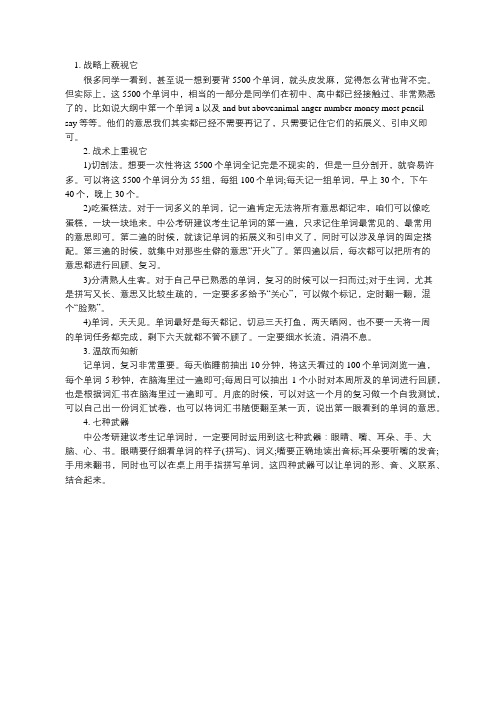
1. 战略上藐视它很多同学一看到,甚至说一想到要背5500个单词,就头皮发麻,觉得怎么背也背不完。
但实际上,这5500个单词中,相当的一部分是同学们在初中、高中都已经接触过、非常熟悉了的,比如说大纲中第一个单词a 以及 and but aboveanimal anger number money most pencilsay等等。
他们的意思我们其实都已经不需要再记了,只需要记住它们的拓展义、引申义即可。
2. 战术上重视它1)切割法。
想要一次性将这5500个单词全记完是不现实的,但是一旦分割开,就容易许多。
可以将这5500个单词分为55组,每组100个单词;每天记一组单词,早上30个,下午40个,晚上30个。
2)吃蛋糕法。
对于一词多义的单词,记一遍肯定无法将所有意思都记牢,咱们可以像吃蛋糕,一块一块地来。
中公考研建议考生记单词的第一遍,只求记住单词最常见的、最常用的意思即可。
第二遍的时候,就该记单词的拓展义和引申义了,同时可以涉及单词的固定搭配。
第三遍的时候,就集中对那些生僻的意思“开火”了。
第四遍以后,每次都可以把所有的意思都进行回顾、复习。
3)分清熟人生客。
对于自己早已熟悉的单词,复习的时候可以一扫而过;对于生词,尤其是拼写又长、意思又比较生疏的,一定要多多给予“关心”,可以做个标记,定时翻一翻,混个“脸熟”。
4)单词,天天见。
单词最好是每天都记,切忌三天打鱼,两天晒网,也不要一天将一周的单词任务都完成,剩下六天就都不管不顾了。
一定要细水长流,涓涓不息。
3. 温故而知新记单词,复习非常重要。
每天临睡前抽出10分钟,将这天看过的100个单词浏览一遍,每个单词5秒钟,在脑海里过一遍即可;每周日可以抽出1个小时对本周所及的单词进行回顾,也是根据词汇书在脑海里过一遍即可。
月底的时候,可以对这一个月的复习做一个自我测试,可以自己出一份词汇试卷,也可以将词汇书随便翻至某一页,说出第一眼看到的单词的意思。
4. 七种武器中公考研建议考生记单词时,一定要同时运用到这七种武器:眼睛、嘴、耳朵、手、大脑、心、书。
考研英语超纲词复习方法
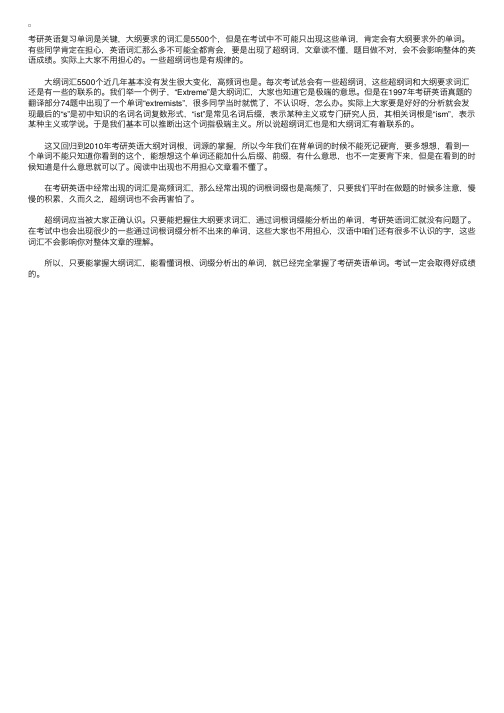
考研英语复习单词是关键,⼤纲要求的词汇是5500个,但是在考试中不可能只出现这些单词,肯定会有⼤纲要求外的单词。
有些同学肯定在担⼼,英语词汇那么多不可能全都背会,要是出现了超纲词,⽂章读不懂,题⽬做不对,会不会影响整体的英语成绩。
实际上⼤家不⽤担⼼的。
⼀些超纲词也是有规律的。
⼤纲词汇5500个近⼏年基本没有发⽣很⼤变化,⾼频词也是。
每次考试总会有⼀些超纲词,这些超纲词和⼤纲要求词汇还是有⼀些的联系的。
我们举⼀个例⼦,“Extreme”是⼤纲词汇,⼤家也知道它是极端的意思。
但是在1997年考研英语真题的翻译部分74题中出现了⼀个单词“extremists”,很多同学当时就慌了,不认识呀,怎么办。
实际上⼤家要是好好的分析就会发现最后的“s”是初中知识的名词名词复数形式,“ist”是常见名词后缀,表⽰某种主义或专门研究⼈员,其相关词根是“ism”,表⽰某种主义或学说。
于是我们基本可以推断出这个词指极端主义。
所以说超纲词汇也是和⼤纲词汇有着联系的。
这⼜回归到2010年考研英语⼤纲对词根,词源的掌握,所以今年我们在背单词的时候不能死记硬背,要多想想,看到⼀个单词不能只知道你看到的这个,能想想这个单词还能加什么后缀、前缀,有什么意思,也不⼀定要背下来,但是在看到的时候知道是什么意思就可以了。
阅读中出现也不⽤担⼼⽂章看不懂了。
在考研英语中经常出现的词汇是⾼频词汇,那么经常出现的词根词缀也是⾼频了,只要我们平时在做题的时候多注意,慢慢的积累,久⽽久之,超纲词也不会再害怕了。
超纲词应当被⼤家正确认识。
只要能把握住⼤纲要求词汇,通过词根词缀能分析出的单词,考研英语词汇就没有问题了。
在考试中也会出现很少的⼀些通过词根词缀分析不出来的单词,这些⼤家也不⽤担⼼,汉语中咱们还有很多不认识的字,这些词汇不会影响你对整体⽂章的理解。
所以,只要能掌握⼤纲词汇,能看懂词根、词缀分析出的单词,就已经完全掌握了考研英语单词。
考研英语大纲解析:三段式备考攻略详解

考研英语大纲解析:三段式备考攻略详解考研复习讲三个阶段,今天离考研还有16周,时间完全来得及。
有同学说英语零基础,还来得及吗?完全来得及。
我以前教过一个同学姓李,是一个三本的孩子考研复习了70天考了93分。
英语2考93分,英语1怎么也得考85分以上。
如果通过了四级考试、通过六级考试也不要骄傲,每年也有很多同学考研三四十、专八考过了。
如果没有通过四级考试那是取得高分的前奏。
考研比四级难两倍。
很多同学四六级分数很高,托福雅思分数很高考研不一定高。
基础好的同学往往容易自以为是,老师说的不听。
考研为什么不能考捷径?基础不太好的同学甚至零基础的同学往往比较谦虚,老师说什么做什么,还有最后120天完全来得及。
按照老师讲的方法去做就可以了。
分三个阶段——第一阶段是攻克词汇今天是8月26号,到9月26号,给你一个月时间把词汇搞定。
考研英语考两个,词汇和语法。
怎么攻克词汇?一般讲一个方法,大家可以记一下,10天搞定考研词汇。
听着像骗人,但是很多人做到了,我已经帮助几百万同学考研成功了。
大家可以上网搜十天搞定考研词汇。
我在2007年发了一个帖子,30%的同学可以10天搞定词汇,每天4到5个小时,50%的同学可以20天搞定。
还有50%的同学一辈子也搞不定,因为你不想吃苦。
和基础没有关系,三个字能吃苦即可。
我也出了一本书,我和刘文涛老师写了十天搞定考研词汇,上市一年卖了十多万册。
我们总结了英语1加英语2,19年真题,搞定3400词汇,背几个最常考的就可以了。
这个方法最大的特色就是快。
这是第一个工作。
第二个工作就是精研真题时间从今天8月26号到11月30号。
三个月的时间。
千万不要做太多模拟题,有同学在做阅读300篇,撕掉,重点放在真题上。
有同学下来找我,真题现在开始做了吗?太早了吗?现在已经不早了。
对于精研真题,又不可能原题重考,确实不太可能原题重考,但是考研句子结构、出题规律等等都是固定的。
昨天晚上我发的微博,只做了五套真题,考研英语93分。
考研英语经验分享:怎么搞定大纲5500词汇?
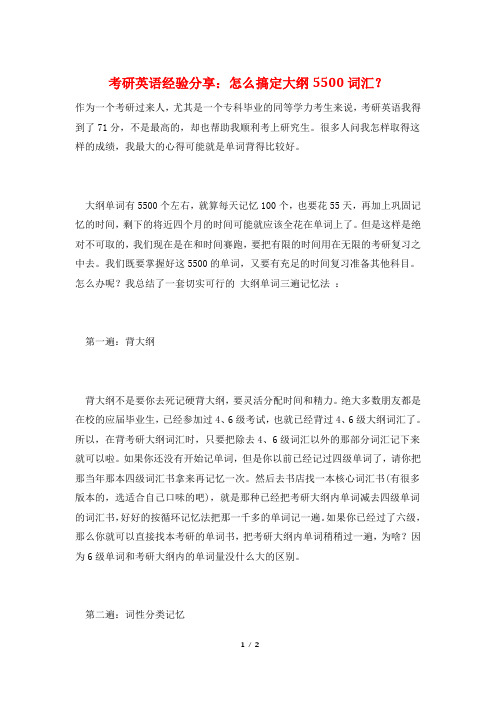
考研英语经验分享:怎么搞定大纲5500词汇?作为一个考研过来人,尤其是一个专科毕业的同等学力考生来说,考研英语我得到了71分,不是最高的,却也帮助我顺利考上研究生。
很多人问我怎样取得这样的成绩,我最大的心得可能就是单词背得比较好。
大纲单词有5500个左右,就算每天记忆100个,也要花55天,再加上巩固记忆的时间,剩下的将近四个月的时间可能就应该全花在单词上了。
但是这样是绝对不可取的,我们现在是在和时间赛跑,要把有限的时间用在无限的考研复习之中去。
我们既要掌握好这5500的单词,又要有充足的时间复习准备其他科目。
怎么办呢?我总结了一套切实可行的大纲单词三遍记忆法:第一遍:背大纲背大纲不是要你去死记硬背大纲,要灵活分配时间和精力。
绝大多数朋友都是在校的应届毕业生,已经参加过4、6级考试,也就已经背过4、6级大纲词汇了。
所以,在背考研大纲词汇时,只要把除去4、6级词汇以外的那部分词汇记下来就可以啦。
如果你还没有开始记单词,但是你以前已经记过四级单词了,请你把那当年那本四级词汇书拿来再记忆一次。
然后去书店找一本核心词汇书(有很多版本的,选适合自己口味的吧),就是那种已经把考研大纲内单词减去四级单词的词汇书,好好的按循环记忆法把那一千多的单词记一遍。
如果你已经过了六级,那么你就可以直接找本考研的单词书,把考研大纲内单词稍稍过一遍,为啥?因为6级单词和考研大纲内的单词量没什么大的区别。
第二遍:词性分类记忆就是把单词按动词、形容词、名词分类记忆一次,这是我在老师帮助下,总结的独门方法。
这一遍的目的是区分重点,因为考研英语中大家普遍感到困惑的难理解的就是动词,我们就应该把记忆单词的时间往动词方面多放点。
这一遍记忆的目标要达到:动词,一定要认得、记得、用得;形容词,要认得、记得;名词,认得即可。
第三遍:词根+联想记忆前两遍记忆强调的是记,而这一遍的记忆强调的是理解、比较记忆了。
是在前两遍基础上的升华。
这样去记忆单词的话,我就不信你在考研英语考试时还能遇见让你困难的单词!。
考研英语超纲词汇的解析
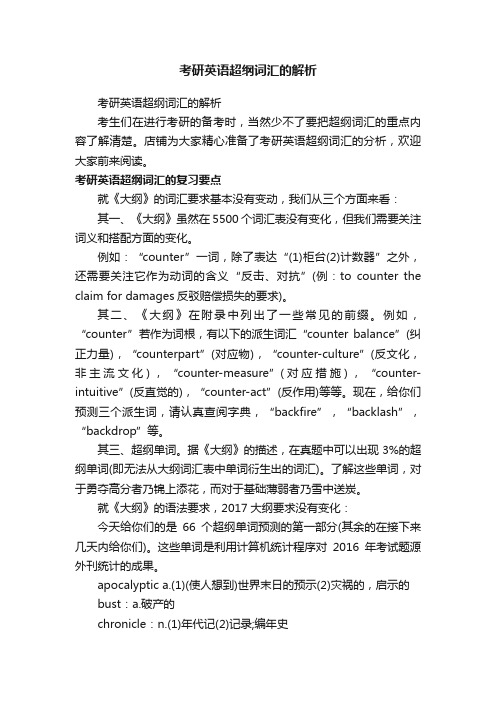
考研英语超纲词汇的解析考研英语超纲词汇的解析考生们在进行考研的备考时,当然少不了要把超纲词汇的重点内容了解清楚。
店铺为大家精心准备了考研英语超纲词汇的分析,欢迎大家前来阅读。
考研英语超纲词汇的复习要点就《大纲》的词汇要求基本没有变动,我们从三个方面来看:其一、《大纲》虽然在5500个词汇表没有变化,但我们需要关注词义和搭配方面的变化。
例如:“counter”一词,除了表达“(1)柜台(2)计数器”之外,还需要关注它作为动词的含义“反击、对抗”(例:to counter the claim for damages反驳赔偿损失的要求)。
其二、《大纲》在附录中列出了一些常见的前缀。
例如,“counter”若作为词根,有以下的派生词汇“counter balance”(纠正力量),“counterpart”(对应物),“counter-culture”(反文化,非主流文化),“counter-measure”(对应措施),“counter-intu itive”(反直觉的),“counter-act”(反作用)等等。
现在,给你们预测三个派生词,请认真查阅字典,“backfire”,“backlash”,“backdrop”等。
其三、超纲单词。
据《大纲》的描述,在真题中可以出现3%的超纲单词(即无法从大纲词汇表中单词衍生出的词汇)。
了解这些单词,对于勇夺高分者乃锦上添花,而对于基础薄弱者乃雪中送炭。
就《大纲》的语法要求,2017大纲要求没有变化:今天给你们的是66个超纲单词预测的第一部分(其余的在接下来几天内给你们)。
这些单词是利用计算机统计程序对2016年考试题源外刊统计的成果。
apocalyptic a.(1)(使人想到)世界末日的预示(2)灾祸的,启示的bust:a.破产的chronicle:n.(1)年代记(2)记录;编年史conundrum n.(1)谜语(2)难题culprit n.(1)罪犯(2)起因demographic a.人口统计学的,人口的detrimental a.有害的dire a.(1)可怕的,悲惨的(2)极其的disparity n.不一致dub v.起绰号,授予称号dystopian a.反面乌托邦的,反面假想国的emoji n.表情符emulate v.(1)效法(2)尽力赶上fanfare n.〈非正式〉炫耀fetish n.恋物,崇拜物genome n.基因组,染色体组grit n.,决心haunt v.(1)徘徊(2)出没(像鬼魂一样)havoc n.(1)大破坏(2)混乱hike n.涨价holistic a.整体的,全盘的hybrid n.混合物复试英语需要提前准备1、见面问候语与告别用语见面问候语:Good morning / afternoon, dear professors. I am XXX. (Nice to meet you.告别用语:Thanks for your time. / Thank you for giving sucha chance. I hope to see you again and soon.2、篇(重点)基本上每个院校每个的口试中都会涉及这一方面。
三个诀窍顺利突破考研英语词汇

三个诀窍顺利突破考研英语词汇对于任何外语学习者来说,词汇记忆都是一件痛苦而乏味的事情,许多考生经常是记了又忘,忘了再记,如此不断反复,便对词汇记忆彻底失去了兴趣,进而放弃了对外语的学习。
那么,有没有一些能激发兴趣、轻松记忆、过目不忘的记忆技巧呢?36路词汇速记术或许能让大家从中得到一些启示和意想不到的收获。
诀窍一:词性串记术1.记忆心法please这个动词,最主要的意思是使高兴,使满意的意思(记住千万不要词义先入为主,见到这个单词就简单地想起请的意思),假设我们没有学过它的名词、形容词和副词形式,你会觉得记起来很难吗?当然不会,因为它们的形状和意思太相像了:negative adj.否定的,消极的,负的,阴性的这个单词,但少有大学生知道它的动词形式negate。
你会感觉到,记住了negative再记忆 negate就能轻松理解。
记忆能手。
negative这个单词之后, 再去记忆剩下的8个单词,是不是很简单?在此要特别说明的是,不要对词义辨析斤斤计较,否则你会越记越糊涂。
一个单词单独拿出来,意思是不固定的,只有放在一个特定的句子或段落中才有固定的意思。
因此我们在词汇记忆的时候,不要把词义记得太死,否则费时费力。
例如,对于有关negative其他词性的单词,我们只需记住它们的意思是跟否定相联系的,然后在语境中去确定它的具体意思。
excel这样的动词,我就问了一下学生什么意思,结果让我大吃一惊,他们竟然异口同声地说是表格文件,实在让人哭笑不得。
如果用词性串记术,你就会恍然大悟:excellent吧?扪心自问,你知道excellent的动词形式是excel 吗?既然excellent的意思是卓越的,优秀的,那么其动词excel 的意思肯定就是比别人优秀,超越别人的意思。
spring后,满脑子就只有一个意思:春天,结果10分的阅读理解得分寥寥。
这时我们不妨从另一角度考虑,spring这个单词。
- 1、下载文档前请自行甄别文档内容的完整性,平台不提供额外的编辑、内容补充、找答案等附加服务。
- 2、"仅部分预览"的文档,不可在线预览部分如存在完整性等问题,可反馈申请退款(可完整预览的文档不适用该条件!)。
- 3、如文档侵犯您的权益,请联系客服反馈,我们会尽快为您处理(人工客服工作时间:9:00-18:30)。
考研英语牛人分享:三遍搞定大纲词汇作为一个考研过来人,尤其是一个专科毕业的同等学力考生来说,考研英语我得到了71分,不是最高的,却也帮助我顺利考上研究生。
很多人问我怎样取得这样的成绩,我最大的心得可能就是单词背得比较好。
大纲单词有5500个左右,就算每天记忆100个,也要花55天,再加上巩固记忆的时间,剩下的将近四个月的时间可能就应该全花在单词上了。
但是这样是绝对不可取的,我们现在是在和时间赛跑,要把有限的时间用在无限的考研复习之中去。
我们既要掌握好这5500的单词,又要有充足的时间复习准备其他科目。
怎么办呢?我总结了一套切实可行的“大纲单词三遍记忆法”:第一遍:背大纲
背大纲不是要你去死记硬背大纲,要灵活分配时间和精力。
绝大多数朋友都是在校的应届毕业生,已经参加过4、6级考试,也就已经背过4、6级大纲词汇了。
所以,在背考研大纲词汇时,只要把除去4、6级词汇以外的那部分词汇记下来就可以啦。
如果你还没有开始记单词,但是你以前已经记过四级单词了,请你把那当年那本四级词汇书拿来再记忆一次。
然后去书店找一本核心词汇书(有很多版本的,选适合自己口味的吧),就是那种已经把考研大纲内单词减去四级单词的词汇书,好好的按循环记忆法把那一千多的单词记一遍。
如果你已经过了六级,那么你就可以直接找本考研的单词书,把考研大纲内单词稍稍过一遍,为啥?因为6级单词和考研大纲内的单词量没什么大的区别。
第二遍:词性分类记忆
就是把单词按动词、形容词、名词分类记忆一次,这是我在老师帮助下,总结的独门方法。
这一遍的目的是区分重点,因为考研英语中大家普遍感到困惑的难理解的就是动词,我们就应该把记忆单词的时间往动词方面多放点。
这一遍记忆的目标要达到:动词,一定要认得、记得、用得;形容词,要认得、记得;名词,认得即可。
第三遍:词根+联想记忆
前两遍记忆强调的是“记”,而这一遍的记忆强调的是“理解”、“比较”记忆了。
是在前两遍基础上的升华。
这样去记忆单词的话,我就不信你在考研英语考试时还能遇见让你困难的单词!
中公考研。
